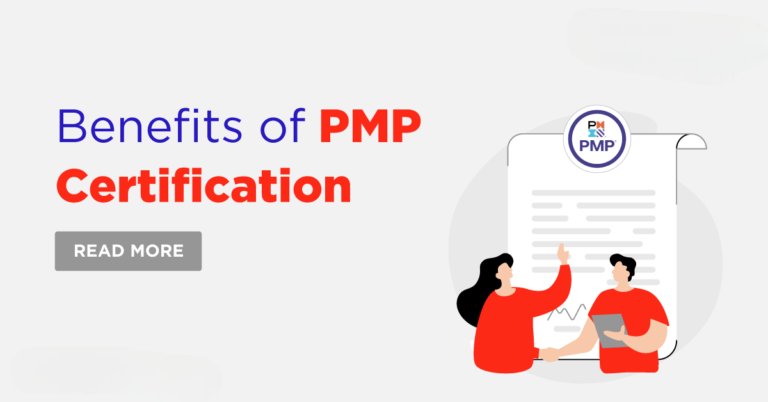Introduction
PMP, or Project Management Professional certification is a globally acclaimed credential offered by Project Management Institute (PMI). It gives you a competitive edge in the industry. Project Managers are important members of any organization. The PMP Online Training program has been designed to train you to become a skilled project manager. This course includes online classes and hands-on project training. This helps you learn various industry-relevant skills and clear the PMP exam easily.
This article explains the benefits of the PMP certification, the exam structure, and its prerequisites. Read on to know more.
How Is PMP Training Helpful?
PMP (Project Management Professional) training can help you in several ways:
- Enhanced Skills: It equips you with advanced project management skills and techniques, helping you become a more effective project manager.
- Certification: Completing PMP training prepares you for the PMP certification exam, which is globally recognized and can boost your career prospects.
- Career Advancement: PMP certification can open doors to higher-paying job opportunities and career advancement. Moreover, many employers prefer PMP-certified project managers.
- Improved Project Success: Furthermore, the knowledge gained from PMP training can lead to better project outcomes. This includes increased project efficiency, reduced risks, and improved stakeholder satisfaction.
- Networking: It provides opportunities to connect with other professionals in the field, facilitating networking and knowledge sharing.
- Global Recognition: In addition, PMP certification is recognized worldwide, making it easier to work on international projects. It also allows you to collaborate with a diverse range of professionals.
- Continual Learning: PMP training emphasizes the importance of continuous learning and staying updated with the latest project management trends and best practices.
- Problem-Solving: Lastly, you will learn effective problem-solving and decision-making techniques, which are valuable skills in any profession.
PMP Certification Prerequisites
To be eligible for the Project Management Professional (PMP) certification, you must meet certain educational and professional requirements established by the Project Management Institute (PMI).
As of the last update in September 2021, here are the eligibility and prerequisites for the PMP certification:
Educational Requirements
You need a Secondary Degree (high school diploma, associate’s degree, global equivalent, etc.). Additionally, you must gain at least five years of project management experience, with a minimum of 7,500 hours leading and directing projects.
Alternatively, you can meet the educational requirement with a four-year degree (bachelor’s degree or global equivalent). In addition, at least three years of project management experience, with a minimum of 4,500 hours leading and directing projects.
Project Management Education
In addition to the above requirements, you must also have completed 35 contact hours of formal education in project management. Many PMP aspirants fulfil this requirement by joining PMP Training in Delhi to learn the best skills.
PMP Exam Structure
As of the last update in September 2021, the PMP (Project Management Professional) exam had a specific structure.
Here is the general structure of the PMP exam as it was at that time:
- Exam Format: The PMP exam is computer-based and consists of multiple-choice questions. It is a four-hour exam.
- Number of Questions: Moreover, the PMP exam typically includes 180 multiple-choice questions.
- Content Areas: The questions are based on the Project Management Institute’s (PMI) PMBOK (Project Management Body of Knowledge) Guide. It covers various domains of project management.
- Domain Distribution: PMP eexam questions are distributed across five performance domains: Initiating (13% of questions), Planning (24% of questions), Executing (31% of questions), Monitoring and Controlling (25% of questions), Closing (7% of questions).
- Scoring: Furthermore, each question is weighted, and candidates receive a score based on their overall performance.
- Passing Score: The passing score is determined by PMI and was not disclosed to candidates. It is based on the difficulty level of the questions.
However, PMI periodically reviews and updates the PMP exam. Therefore, we suggest you to visit the official PMI website to obtain the most current and accurate information.
Conclusion
To conclude, PMP training can significantly enhance your project management capabilities. Moreover, this certificate helps you boost your career, and improve your ability to deliver successful projects. PMP-certified professionals often get hired in highly-paying jobs. Additionally, you will learn effective problem-solving and decision-making techniques, which are valuable skills in any profession.
Hello guys I’m Ashu, a Digital Marketer, My biggest aim is to achieve good results for the company.

